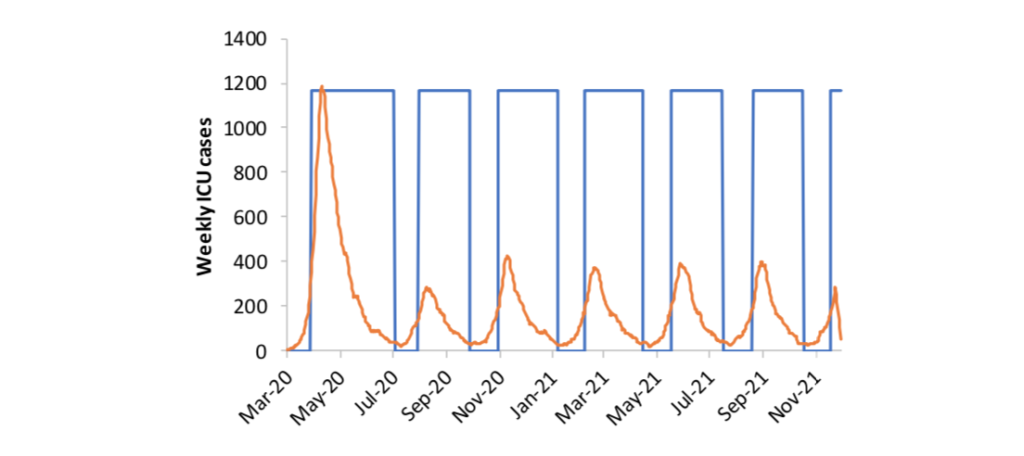This blog is now also available as a once-a-day email. If you think this might work better for you why not subscribe here? (It’s free and there’s a 1-click unsubscribe if you subsequently decide you need to prune your inbox!) One email a day, in your inbox at 07:00 every morning.
Quote of the Day
“Those who would give up essential liberty to purchase a little temporary safety deserve neither.”
- Benjamin Franklin
Should we cross the privacy Rubicon? Will we?
Maciej Ceglowski, a great privacy campaigner and one of the best online essayists around, (and also proprietor of Pinboard.in the best bookmarking site on the Internet) uses the Franklin quote above in a sobering reflection on the Coronavirus pandemic. His essay is prompted by the ongoing (and intensifying) debate about whether the current ‘lockdown+isolation’ strategy for ‘flattening the curve’ of infections) is economically, psychologically and politically sustainable.
Everybody knows that even when we’re through the initial crisis the disease will not have been eliminated. It’ll be back in waves, hopefully of lesser intensity and reach, and each wave may necessitate a briefer return to another lockdown regime. So the economic and other consequences could continue, perhaps for 18 months or more.
What should we do, therefore, after the initial outbreak is contained — or at least rendered manageable in terms of health-service capacity? Ideally, we should have a managed return to work with people who have had the virus and recovered from it (and thereby acquired immunity) able to work normally. But we can’t do that safely unless we have a vaccine (months away at best, a year at worst) or a way of identifying who is infectious and capable of infecting others.
There’s already a strategy for doing the latter task: test extensively and track contacts of those who are infections. That’s what South Korea, Taiwan and China seem to have been able to do. But in the UK we’re still ages away from being able to roll out a large-scale testing programme. (Getting testing up and running at scale is pretty challenging.) We will get there eventually, though, and when we do the next task will be to track the contacts of every infected person.
Trouble is: that kind of tracking is incredibly labour-intensive. But, says Ceglowski,
we could automate large parts of it with the technical infrastructure of the surveillance economy. It would not take a great deal to turn the ubiquitous tracking tools that follow us around online into a sophisticated public health alert system.
Every one of us now carries a mobile tracking device that leaves a permanent trail of location data. This data is individually identifiable, precise to within a few meters, and is harvested by a remarkable variety of devices and corporations, including the large tech companies, internet service providers, handset manufacturers, mobile companies, retail stores.
Anyone who has this data can retroactively reconstruct the movements of a person of interest, and track who they have been in proximity to over the past several days. Such a data set, combined with aggressive testing, offers the potential to trace entire chains of transmission in real time, and give early warning to those at highest risk.
So it’s possible to do it. Doing so will probably enable a return to some kind of economic normality. But if we use the technology for this purpose we will have crossed the Rubicon into nightmare territory. And if we do cross, there’s unlikely to be a way back — because once states have acquired access to this technology, they rarely give it up. So will we do it?
Ceglowski thinks that we should. After all, he says,
This proposal doesn’t require us to give up any liberty that we didn’t already sacrifice long ago, on the altar of convenience. The terrifying surveillance infrastructure this project requires exists and is maintained in good working order in the hands of private industry, where it is entirely unregulated and is currently being used to try to sell people skin cream. Why not use it to save lives?
The most troubling change this project entails is giving access to sensitive location data across the entire population to a government agency. Of course that is scary, especially given the track record of the Trump administration. The data collection would also need to be coercive (that is, no one should be able to opt out of it, short of refusing to carry a cell phone). As with any government surveillance program, there would be the danger of a ratchet effect, where what is intended as an emergency measure becomes the permanent state of affairs, like happened in the United States in the wake of the 2001 terrorist attacks.
“I am a privacy activist”, Ceglowski writes, “typing this through gritted teeth”.
But I am also a human being like you, watching a global calamity unfold around us. What is the point of building this surveillance architecture if we can’t use it to save lives in a scary emergency like this one?
Great essay. Worth reading in full.




